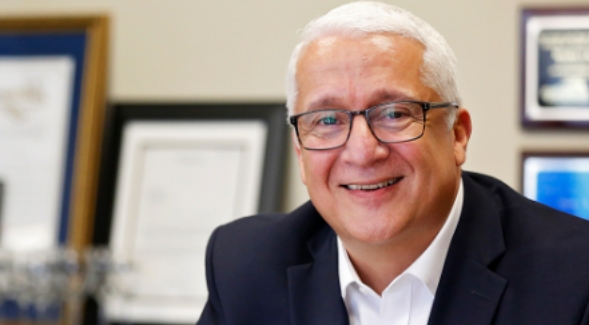Business Graduates Volunteer Work at AIDS Information Line Leads to A Lifetime Of Community Service
Mamas Kitchen CEO Alberto Cortes says he still uses the lessons he learned from his SDSU executive MBA program.

With both his mother and maternal grandmother heavily involved in their local communities, Mama’s Kitchen CEO and San Diego State University alumnus Alberto Cortes (’00, Executive MBA) said a life of service is “in my blood.”
His journey began as a 20-year-old college student when he came out for the first time. Shortly thereafter, he left the University of Puerto Rico-Mayagüez and joined the U.S. Navy, which did not permit LGBTQ+ service members at the time. However, Cortes successfully served in the Navy aboard a nuclear-powered submarine and moved to San Diego in May 1983.
By then, AIDS had emerged as a national health crisis, although its cause was not yet known. Following in the footstep of SDSU student and fellow Navy veteran Jess Jessop, who is credited with leading the local gay rights movement in the ‘70s, Cortes, began volunteering in 1983 with the San Diego AIDS Information Line.
“This was one of the first efforts to respond to the pending AIDS epidemic,” said Cortes. “At the time, there were only 22 reported cases of AIDS in San Diego.”
It was the first time Cortes was involved in community service to support people living with AIDS, but it would not be the last. He has been involved with HIV and AIDS-related health support services ever since.
In 1998, while he was working as the clinic director/director of HIV services at the Family Health Centers of San Diego, he chose to return to college to get his MBA.
“I was compelled to pursue a master’s degree in business because I thought I would be able to use those skills effectively in the nonprofit community,” said Cortes. “The Executive MBA program at SDSU was perfect because I could both work full-time and go to school full-time.”
In 2000 — the same year he earned his Executive MBA from what was then the SDSU College of Business Administration — Cortes was asked to join the board of directors at Mama’s Kitchen. In 2002, he was named the executive director of the organization.
Mama’s Kitchen
Cortes is now the CEO of Mama’s Kitchen, a San Diego not-for-profit organization established in 1990 to deliver meals to individuals with AIDS. Since then, Mama’s Kitchen has expanded its reach to deliver meals to other chronically ill individuals, including those with cancer, diabetes, congestive heart failure and COVID-19. In March 2021, the organization celebrated the delivery of its 10 millionth meal.
Cortes says he still uses the lessons he learned from his SDSU executive MBA program.
“I’ve applied many of the lessons learned in graduate school to my work, including the importance of collaboration and a set of invaluable communications skills that range from memo writing to staging a formal presentation,” he said. “The business management and accounting courses provided key, fundamental knowledge that I always fall back on to help me lead a nonprofit organization.”
His SDSU experience affected him on a personal level as well. “To this day, there are a number of classmates from days at SDSU that I’ve stayed in contact with,” said Cortes. “Some of them are long-time supporters of Mama’s Kitchen.”
As Mama’s Kitchen reaches its 32nd year of serving meals to people living with AIDS and others in need, they will also be preparing for the San Diego’s Pride Celebration, as they have done for many years. “Mama’s Kitchen is a proud member of the LGBTQ+ community. We look forward to the opportunity to affirm our affiliation with the community and to express our gratitude to those who have provided us with decades of support,” said Cortes.
For MBA students who are considering following Cortes’ example by pursuing a career in a community service organization, he said: “The rewards are many, as are the challenges. And in the process of service to our communities, this field has provided the opportunity to work with some really amazing people. I am a better person from this experience.”



